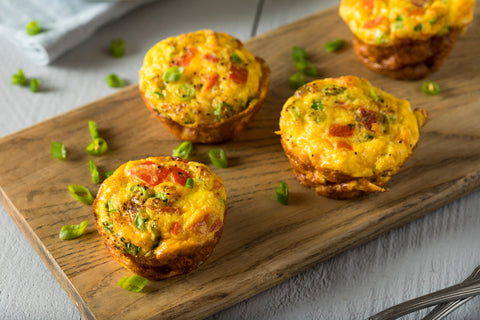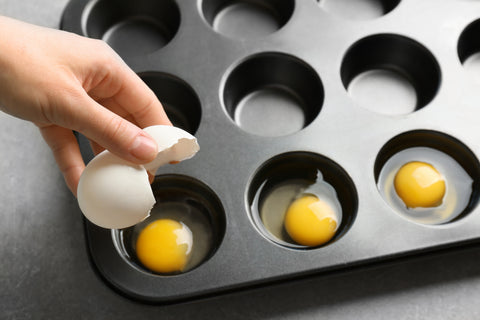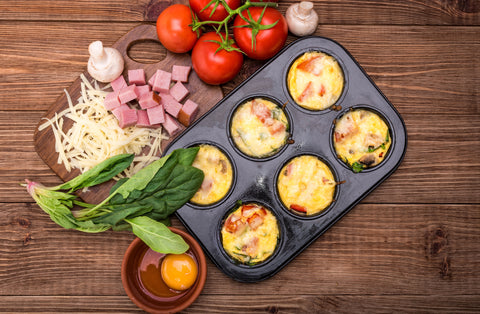How To Avoid Egg Cups Sticking To The Muffin Pan To Save A Busy Breakfast?
It has happened to all of us. When you want to make a batch of egg cups – either for a quick breakfast recipe or a preplanned meal – they have stuck to the pan. Don’t panic! There are many ways to fix this issue, and you can start making egg cups like a pro.

Photo by bhofack2 / Depositphotos
Egg cups get stuck to the muffin pan due to,
- Inadequate Greasing
- High Temperature
- Rough Surfaced Muffin Tray
Egg cups are both a nutritious and comfort food, but cleaning egg residues from the muffin pans can be a real bother and frustrating. To ensure you don’t end up scratching the muffin pan and spoiling your day, follow these simple tips to prevent them from sticking to the pans.
Read on to find out the ways to avoid your egg cups from sticking and baking them like a breeze each time you plan to make them.
1. How To Prevent Your Egg Cups From Sticking?
i) Grease The Muffin Pan:
Egg cups are the go-to breakfast meal that everyone in the family loves. They are easy and quick to make, so saves time like no other. But, unfortunately, getting them stuck to the pan can be heartbreaking and messy.
When we talk about egg cups sticking, the real culprits are the egg whites. To prevent this, grease the muffin pan generously with oil or butter. But the best option is to use a nonstick cooking spray. If you try these tips, you will surely have perfect egg cups every time!

Photo by belchonock / Depositphotos
ii) Use Paper Liners:
If you want to avoid heavily greasing your pan, try paper liners. Paper liners effectively prevent your egg cups from sticking.
Simply line the cups with paper liners and lightly grease the paper liners with a little bit of cooking spray or oil. If you don’t use grease or cooking spray, your egg cups will stick to your paper liners instead of your pans, and you will have egg cup residue sticking to the paper liners.
The paper liner will help to keep the eggs from sticking to the pan, and the grease will help prevent the lining paper from sticking to the eggs.
iii) Silicone Muffin Pans:
Silicone pans can be your savior if you regularly bake egg muffins. So, go ahead and ditch your old metal muffin pans and switch over to silicone muffin pans.
They are a great option if you don’t want to use cooking spray or are on a no/less-oil diet. Plus, they go easy on your pockets too.
They help you achieve an even bake.
These are nonstick bakeware, so taking out your egg cups will be no more a tricky chore. They are also very easy to clean, as you can toss them right into the dishwasher once you are done with your baking.
And there’s more! They are also microwave friendly.
iv) Silicone Baking Cups:

Photo by VadimVasenin / Depositphotos
They are another great option if you opt to only bake a few egg cups or bake a whole lot of them at a time. However, they can be floppy, lacking support. Also, transferring them (filled to the brim with egg liquid) into the oven can be challenging. So, use a metal baking sheet or a muffin pan to get them inside the oven.
Otherwise, silicone baking cups pretty much have the same advantages as silicone muffin pans.
Also, they come in lots of different colors and shapes, so you can have fun baking with them making your egg cups look exciting and fun for your family.
2. Can You Reheat The Egg Cups?
Egg cups are a quick savory treat that anyone would relish. So, if you are someone who preplans your meals and cooks them on the weekends, then you don’t want to miss out on the egg cups.
This is because reheating them can be so quick and easy.
Refrigerated egg cups can be microwaved for approximately 25-30 seconds. If you have frozen your egg cups, reheat them for about 50-60 seconds.
With different microwaves, the timings can vary. Since overheating your egg cups can turn them rubbery, warm them up for 15 seconds, then remove them and check. Reheat them only if necessary. This will help you retain the softness of your delicious egg cups.
3. How Long Do The Baked Egg Cups Last In The Fridge?
One week roughly, with proper packing in an air-tight container or a resealable plastic bag.
4. Why Do My Egg Cups Collapse?
Collapsed egg muffins are a great disappointment – a wasted time and effort and a failed recipe.

Photo by RasulovS / Depositphotos
Inside the oven, the egg muffins looked perfect. Then, just when you are about to pat your back and bring them outside, they become a terrible disaster. Not to worry! This is a common problem; it can be rectified by following a few things religiously.
The most common reason for your egg cups collapsing is an overheated oven. Avoid this to make your egg cups a sure success.
The next one is beating the eggs for too long. This adds a lot of air to the beaten egg mixture, which makes the muffins light and fluffy. However, the air bubbles collapse when the muffins are exposed to a sudden temperature change. So, next time you bake, cool the egg muffins by placing them on a wire rack and avoid temperature shocks.
Wrapping up, there is no question that egg cups are the perfect breakfast recipe and an all-time favorite of every family. While baking the egg cups itself is easy, getting them out of the pan and cleaning the pans can become a hassle if they get stuck to the pan. We went through different pan options and the reasons behind the sticking of egg cups, and how to correct it if you choose to use the same pan or by choosing to use a different pan.
While greasing the muffin pan with cooking spray, oil, or butter before adding the egg mixture may be the best suited for metal muffin pans, try using silicone muffin pans or silicone egg cups, both of which are nonstick and easy to clean and are a permanent solution to the problem. If you follow these simple tips, you will soon be a pro at making perfect egg cups every time!

